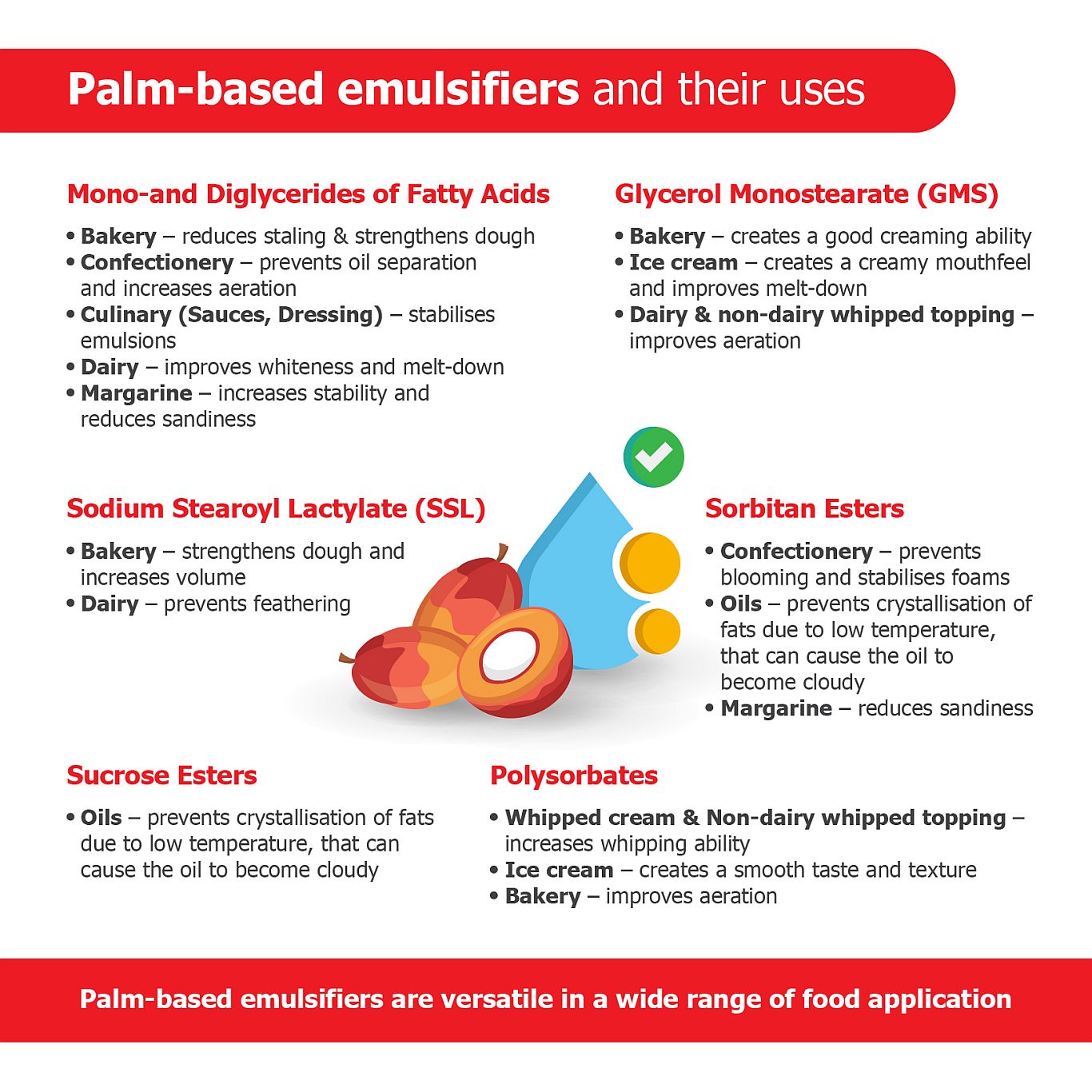Emulsifier In Food Health Considerations: Facts You Can Trust
Reveal the Advantages of Utilizing an Emulsifier in Food for Enhanced Culinary Experiences
Emulsifiers are commonly ignored yet necessary parts in cooking practices. They assist in the mixing of disparate active ingredients, improving both flavor and structure. By guaranteeing stability, emulsifiers prevent the unpleasant separation of blends. Their flexibility covers different applications, from sauces to dressings. Recognizing their function can bring about considerable renovations in food top quality and discussion. What certain advantages do emulsifiers offer that can change everyday recipes right into phenomenal cooking experiences?
Understanding Emulsifiers: What They Are and Just how They Work
Emulsifiers play an essential function in the food industry, functioning as agents that promote the mixing of water and oil, two materials that normally do not blend. These substances possess both hydrophilic (water-attracting) and hydrophobic (oil-attracting) properties, permitting them to support mixes by lowering the surface area tension in between both stages. Common emulsifiers consist of lecithin, mono- and diglycerides, and particular proteins.
When included in food, emulsifiers create a stable emulsion, preventing separation and guaranteeing an uniform texture - Emulsifier In Food. They are important in several applications, ranging from salad dressings and mayonnaise to gelato and sauces. By preserving the stability of mixes, emulsifiers not just improve the visual charm of food yet also enhance mouthfeel and consistency. Their ability to maintain emulsions makes them vital in modern food formulation, contributing significantly to the top quality and rack life of numerous products
The Function of Emulsifiers in Flavor Improvement
While commonly forgotten, emulsifiers substantially add to flavor enhancement in foodstuff. They play a vital function in enhancing the general taste experience by assuring that flavor substances are equally dispersed throughout a meal. By maintaining solutions, such as dressings or sauces, emulsifiers prevent the splitting up of oil and water, enabling tastes to blend with each other much more properly. This uniform circulation not only magnifies the preference yet additionally guarantees that each bite is regularly flavorful.
In addition, emulsifiers can enhance the assumption of certain flavors, making them a lot more obvious on the palate. They may communicate with details components, helping to release volatile flavor compounds that contribute to a dish's aromatic account. The usage of emulsifiers can substantially boost the cooking experience, changing straightforward dishes into complicated and fascinating flavor journeys. Their subtle yet impactful duty in taste enhancement should not be taken too lightly in the art of food preparation.
Emulsifiers and Structure: Producing Creamy and Velvety Dishes
The impact of emulsifiers expands past taste improvement to the domain of appearance, where they are important in creating silky and creamy dishes. By assisting in the uniform distribution of fats and water, emulsifiers enable the development of steady solutions, resulting in an elegant mouthfeel. This is particularly obvious in items like mayo, sauces, and dressings, where a smooth, creamy uniformity is desired.
Emulsifiers such as lecithin and mono- and diglycerides function to lower surface tension in between components, enabling an unified mix that enhances the sensory experience. The velvety structure achieved via emulsification can boost dishes, making them much more satisfying and attractive. Furthermore, the ability to create a more info here silky texture permits cooks to integrate various components without jeopardizing consistency, resulting in cutting-edge cooking developments. Basically, emulsifiers play a necessary role in changing ordinary meals into phenomenal culinary experiences with appearance enhancement.
Security Issues: How Emulsifiers Prevent Separation
A crucial element of cooking emulsifiers is their capability to prevent splitting up, ensuring that items maintain their desired texture you can look here and appearance with time. Emulsifiers operate by stabilizing mixes of oil and water, which naturally have a tendency to divide because of differences in thickness and polarity. By minimizing surface area tension at the oil-water interface, emulsifiers help with the formation of secure emulsions, enabling a consistent distribution of components.

Typical Emulsifiers in Cooking and Their Applications
Recognizing the numerous emulsifiers typically made use of in cooking reveals their considerable duties in enhancing food texture and security. Lecithin, originated from egg yolks or soybeans, is widely used in mayonnaise and salad dressings, offering a velvety uniformity. Mustard, likewise an emulsifier, help in stabilizing vinaigrettes while imparting flavor.


One more popular emulsifier is xanthan gum, regularly utilized in gluten-free baking and sauces for its thickening homes. Guar periodontal serves a similar function, improving the structure of gelato and dairy products.
Mono- and diglycerides, often found in refined foods, aid boost shelf life and keep texture. Casein, a milk protein, is made use of in cheese-making and creamy more sauces, adding to a smooth mouthfeel. Each of these emulsifiers plays a vital function in cooking applications, avoiding and ensuring preferable appearances separation in diverse foodstuff.
Often Asked Questions
Are Emulsifiers Safe for Individuals With Food Allergies?
Emulsifiers can be risk-free for people with food allergies, depending upon the particular emulsifier used. It is important to recognize the resource of the emulsifier, as some may cause allergies in delicate individuals.
How Do Emulsifiers Affect the Nutritional Web Content of Food?
Emulsifiers can affect the dietary web content of food by boosting nutrition absorption and improving appearance. Their presence may additionally water down certain nutrients, depending on the food matrix, potentially changing total dietary value.
Can Emulsifiers Be Utilized in Vegan Food Preparation?
Emulsifiers can be effectively utilized in vegan cooking, providing appearance and security to meals. Plant-based emulsifiers like lecithin, originated from soy or sunflower, aid blend components, improving the total quality of vegan culinary productions.
What Are the Ecological Effects of Emulsifier Manufacturing?
The ecological influences of emulsifier manufacturing commonly consist of logging, water air pollution, and high energy consumption. Additionally, some sources of emulsifiers can contribute to biodiversity loss, elevating issues concerning sustainability in food production techniques.
How Do Emulsifiers Contrast to Natural Thickeners in Food Preparation?
Emulsifiers provide smoother structures and boosted security contrasted to all-natural thickeners, which can give distinct flavors - Emulsifier In Food. While emulsifiers enhance mouthfeel and appearance, all-natural thickeners offer even more health and wellness advantages and can add to the recipe's flavor profile
When included to food products, emulsifiers develop a secure solution, protecting against splitting up and guaranteeing a consistent texture. While often forgotten, emulsifiers greatly contribute to taste enhancement in food products. Comprehending the various emulsifiers generally made use of in food preparation discloses their significant roles in improving food appearance and stability. Emulsifiers can be risk-free for individuals with food allergic reactions, depending on the certain emulsifier made use of. Emulsifiers can influence the dietary web content of food by boosting vitamins and mineral absorption and improving structure.